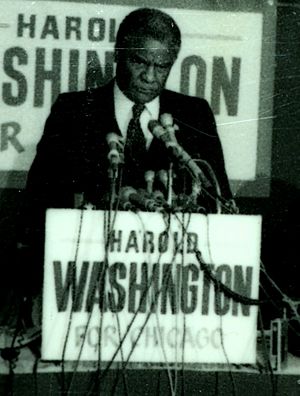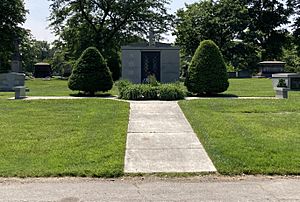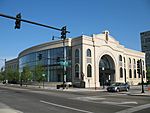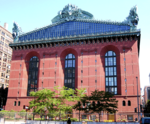Harold Washington facts for kids
Quick facts for kids
Harold Washington
|
|
|---|---|
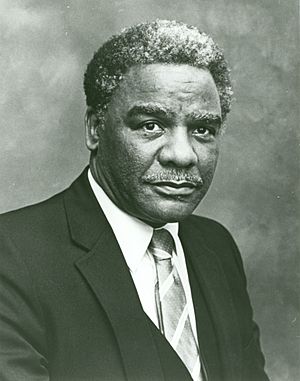 |
|
| 51st Mayor of Chicago | |
| In office April 29, 1983 – November 25, 1987 |
|
| Deputy | Richard Mell David Orr |
| Preceded by | Jane Byrne |
| Succeeded by | David Orr (acting) |
| Member of the U.S. House of Representatives from Illinois's 1st district |
|
| In office January 3, 1981 – April 30, 1983 |
|
| Preceded by | Bennett Stewart |
| Succeeded by | Charles A. Hayes |
| Member of the Illinois Senate from the 26th district |
|
| In office May 7, 1977 – November 20, 1980 |
|
| Preceded by | Cecil A. Partee |
| Succeeded by | James C. Taylor |
| Member of the Illinois House of Representatives from the 26th district |
|
| In office March 22, 1965 – August 8, 1976 |
|
| Personal details | |
| Born |
Harold Lee Washington
April 15, 1922 Chicago, Illinois, U.S. |
| Died | November 25, 1987 (aged 65) Chicago, Illinois, U.S. |
| Resting place | Oak Woods Cemetery |
| Political party | Democratic |
| Spouse |
Dorothy Finch
(m. 1942; div. 1950) |
| Domestic partner | Mary Ella Smith (1967–1987) |
| Education | Roosevelt University (BA) Northwestern University (JD) |
| Signature | |
| Military service | |
| Allegiance | |
| Branch/service | |
| Years of service | 1942–1945 |
| Rank | First Sergeant |
| Unit | United States Army Air Corps United States Army Air Forces |
| Battles/wars | World War II • South Pacific • Central Pacific |
Harold Lee Washington (April 15, 1922 – November 25, 1987) was an American lawyer and politician. He made history as the 51st Mayor of Chicago, becoming the first African American to hold this important position. He served as mayor from April 29, 1983, until his death in November 1987.
Born and raised in Chicago's Bronzeville neighborhood, Harold Washington was interested in politics from a young age. After finishing college and law school, he became involved in local politics. Before becoming mayor, he served in the U.S. House of Representatives from 1981 to 1983. He also spent many years serving in the Illinois State Senate and the Illinois House of Representatives from 1965 to 1976.
Contents
Early Life and Education
Family History
Harold Washington's family history in America goes back to his great-grandfather, Isam Washington. Isam was born into slavery in North Carolina in 1832. During the American Civil War, he joined the United States Colored Heavy Artillery. After the war, he became a farmer in Kentucky.
Isam's son, Isom McDaniel (Mack) Washington, was born in 1875. Mack became a minister in the African Methodist Episcopal (A.M.E.) Church. Harold Washington's father, Roy L. Washington, was born in 1897 in Kentucky.
Growing Up and School
Harold Lee Washington was born in Chicago, Illinois, on April 15, 1922. His parents were Roy and Bertha Washington. His father, Roy, was a lawyer and one of the first Black precinct captains in Chicago. He was also a Methodist minister. Harold had two older siblings, Roy Jr. and Geneva, and a younger brother, Edward.
Harold grew up in Bronzeville, a Chicago neighborhood known as a center for Black culture. He attended DuSable High School, which was a newly established public high school for Black students at the time. He was part of its first graduating class. Harold was also a talented athlete, winning first place in a citywide track meet for high hurdles.
After high school, Harold worked for a while before joining the military. He married Nancy Dorothy Finch when he was 19.
Serving His Country
In 1942, during World War II, Harold Washington was drafted into the United States Army. He was part of a racially segregated unit of the U.S. Army Air Corps engineers. These engineers built runways for planes in places like the Philippines. Harold rose through the ranks and became a First Sergeant in the Army Air Forces.
College Years
After the war, in 1946, Harold Washington enrolled at Roosevelt College. This college was known for welcoming students of all backgrounds, unlike many other schools at the time. Harold became very active in student government. He was elected president of Roosevelt's student council.
During his time at Roosevelt, Harold was known for being calm and thoughtful. He avoided extreme actions and preferred to work within the system to bring about change. He graduated in 1949 with a Bachelor of Arts degree.
Law School
After college, Harold Washington went on to study law at Northwestern University School of Law. He was the only Black student in his class. While there, he was elected treasurer of the Junior Bar Association. He also joined a fraternity for students from minority groups, as other fraternities excluded them. Harold graduated with his law degree in 1952. During this time, he and his first wife, Dorothy Finch, divorced.
Starting in Politics
From 1951 until 1965, Harold Washington worked in the office of Ralph Metcalfe, a Chicago Alderman. Metcalfe was a powerful figure in the Democratic Party. Washington began organizing the Young Democrats group in his ward. This group pushed for changes that would help Black communities. Harold believed in working within the political party to make a difference.
During this time, Harold met Mary Ella Smith. They were partners for many years. Mary Ella understood Harold's deep passion for politics.
Harold also worked with groups like the Chicago League of Negro Voters. These groups helped elect independent candidates who were not part of the main political machine. This experience was important for his future political career.
Legislative Career
Illinois House (1965–1976)
In 1965, Harold Washington was elected to the Illinois House of Representatives. His time in the House was often marked by disagreements with the leaders of the Democratic Party. He was recognized as a very independent legislator.
Washington became a strong supporter of Black rights. He worked on bills to ensure fair housing and employment practices. He also pushed for a state Civil Rights Act to strengthen protections against discrimination. He used clever political tactics to try and get his bills passed.
He also worked to honor civil rights leaders. He helped pass a resolution honoring his mentor, Ralph Metcalfe. He also worked to make Martin Luther King Jr.'s birthday a commemorative day in Illinois public schools, and later a state holiday.
Illinois Senate (1976–1980)
In 1975, Harold Washington was elected to the Illinois Senate. His main goal in the Senate was to pass the Illinois Human Rights Act of 1980. This important law rewrote all the state's human rights laws. It aimed to stop discrimination based on things like "race, color, religion, sex, national origin, age, marital status, physical or mental disability, military status, and sexual orientation" in areas like jobs, housing, and public places.
The bill faced many challenges in the House of Representatives, with some lawmakers trying to stop it. But with hard work and support from others, the bill eventually passed and became law.
U.S. House (1981–1983)
In 1980, Harold Washington was elected to the United States House of Representatives for Illinois's 1st congressional district. He often traveled back to Chicago to campaign for re-election, which meant he missed some votes in the House.
His biggest achievement in Congress was helping to extend the Voting Rights Act of 1965. This law protects the right of all citizens to vote, especially African Americans. Some politicians wanted to weaken the act, but Washington worked hard to make sure it remained strong. He spoke clearly and thoughtfully, helping to defeat amendments that would have harmed the law. Because of his efforts, the Voting Rights Act Extension was passed.
By 1982, Harold Washington was very popular in his district. With his re-election to Congress secure, he began to focus on the next Chicago mayoral election.
Mayor of Chicago (1983–1987)
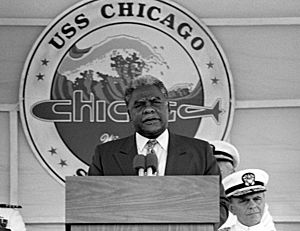
1983 Chicago Mayoral Election
In the February 1983 Democratic mayoral primary election, more than 100,000 new voters registered. Harold Washington won the primary with 37% of the vote, defeating the current mayor, Jane Byrne, and Richard M. Daley.
Winning the Democratic primary usually meant winning the general election in Chicago, which was a heavily Democratic city. However, after his primary victory, many powerful Democrats supported his Republican opponent, Bernard Epton. Washington focused his campaign on reforming the city's "patronage system" (where political jobs are given based on loyalty, not skill) and creating jobs.
On April 12, 1983, Harold Washington defeated Epton by a small margin, becoming the first African American mayor of Chicago. He was sworn into office on April 29, 1983.
First Term and Council Wars
Harold Washington's first term as mayor was marked by a lot of conflict with the City Council. This period was nicknamed "Council Wars". A group of 29 aldermen (city council members) often refused to approve Washington's plans or his choices for city jobs. This made it difficult for him to get things done.
These 29 aldermen were led by Edward Vrdolyak and Edward Burke. They were supported by many members of the Democratic Party. Washington had to use his power to veto (reject) their decisions. The opposing group didn't have enough votes to override his vetoes.
Washington also worked to change the city council districts, which had been set up unfairly. In special elections in 1986, more candidates who supported Washington won. This gave him enough allies in the City Council to break ties and pass his programs.
1987 Election
Harold Washington ran for re-election in 1987. He defeated former mayor Jane Byrne in the Democratic primary. Then, in the general election, he won against Edward Vrdolyak and Donald Haider. This victory secured his second term as mayor. After his re-election, many of his political opponents lost their power.
Political Education Project (PEP)
From 1984 to 1987, Harold Washington had a political organization called the Political Education Project (PEP). This group helped organize his campaigns and supported other politicians who were his allies. PEP helped with voter registration and getting people to the polls on Election Day.
Thanks to PEP's efforts, Washington's plans in the City Council gained support, and his popularity grew. The organization helped him prepare for his 1987 re-election campaign. PEP stopped its work after Harold Washington's death. Its records are kept at the Harold Washington Library Center in Chicago.
DuSable Park
During his time as mayor, Washington announced a plan to create DuSable Park. This park was named after Jean Baptiste Point du Sable, who is considered the founder of Chicago. The project is still in progress today.
Approval Ratings
Even with the conflicts in the City Council, Harold Washington was very popular with Chicago residents. Polls showed that many people approved of his work as mayor.
| Segment polled | Polling source | Date | Approve | Disapprove | Sample size | Margin-of-error | Polling method | Citation |
|---|---|---|---|---|---|---|---|---|
| Registered voters | Market Shares Corp. and Chicago Tribune | March 12–15, 1987 | 67% | 1,145 | ±3 | Telephone | ||
| Registered voters | Penn Schoen | October 1986 | 54% | 39% | 1,200 | |||
| Residents | Chicago Tribune | October 29–November 3, 1985 | 60% | 30% | 515 | |||
| Residents | Chicago Tribune | March 1985 | 35% | 21% | ||||
| Chicago Tribune | 1985 | 54% | 36% |
Death and Funeral
On November 25, 1987, Harold Washington suddenly collapsed at his desk in City Hall. Paramedics rushed him to the hospital, but he could not be saved. He was pronounced dead at 1:36 p.m.
News of his death brought shock and sadness to many people in Chicago. Thousands of Chicagoans attended his wake at City Hall. His funeral service was held on November 30, 1987. Harold Washington was buried in Oak Woods Cemetery on the South Side of Chicago.
Legacy
Harold Washington's time as mayor changed Chicago. He once joked that people used to think of Chicago with "Boom-boom! Rat-a-tat-tat!" but now they would ask, "How's Harold?"
After his death, many places in Chicago were named in his honor. The main branch of the Chicago Public Library is now called the Harold Washington Library Center. This library also holds special collections about his life and political career.
Other places named after him include Harold Washington College, Harold Washington Elementary School, and the Harold Washington Cultural Center in the Bronzeville neighborhood. A city park where he lived was also renamed Harold Washington Park.
Harold Washington's legacy continues to be an important part of Chicago's history.
See also
- List of African-American United States representatives
- Ed Lee, first Asian American Mayor of San Francisco, who also died in office of a heart attack at the same age as Washington
- Events in the Life of Harold Washington (mural)
 | Bayard Rustin |
 | Jeannette Carter |
 | Jeremiah A. Brown |


